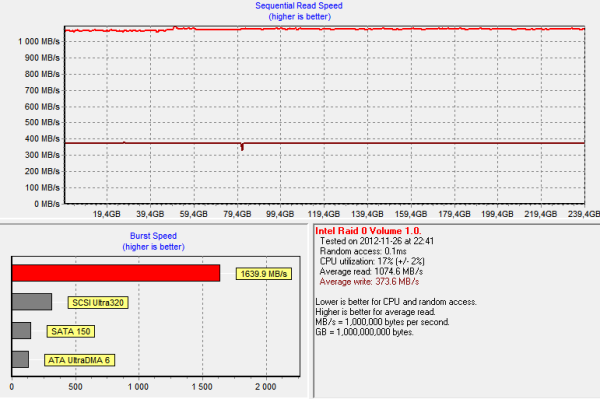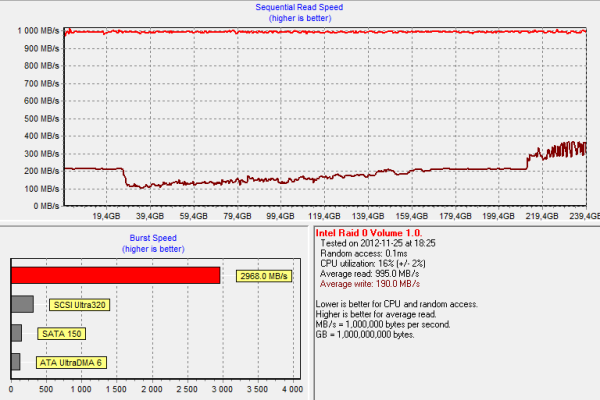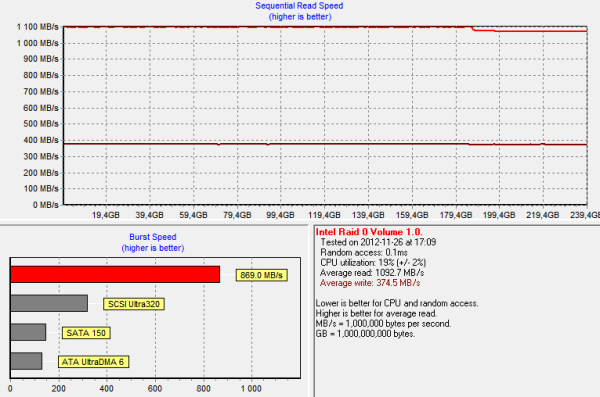TRIM & RAID-0 SSD Arrays Work With Intel 6-Series Motherboards Too
by Kristian Vättö on November 28, 2012 11:53 AM ESTA few months ago, Intel brought TRIM support to RAID-0 SSD arrays but limited it to its latest 7-series chipsets. As 7 and 6-series chipsets are very similar, there was no good explanation to why Intel didn't include support for 6-series chipsets other than forced feature differentiation and/or not wanting to go through a lengthy validation process on an older platform. We have covered the reasons why you should want TRIM in the past but the main benefits are obvious: more consistent performance and higher endurance. Limiting the support to only 7-series chipsets was a huge letdown.
Fortunately the Internet is full of extremely knowledgeable and ethusiastic people with the drive to look for unofficial solutions. AnandTech forum members Dufus and Fernando 1 have been able to modify the RAID OROM so that TRIM and RAID-0 SSD arrays now work with at least Z68 and P67 chipsets, both of which are unsupported by the official OROM. While the forum thread is already full of posts showing that the modification works, I wanted to try it myself and to see how smooth the process was.
Testing TRIM on RAID-0 with Intel Z68
My test platform is the ASRock Z68 Pro3. First I set the SATA mode to RAID and installed Windows 7 (64-bit) to a spare SSD I had. I didn't install any updates or drivers other than Intel RST 11.6 drivers to enable RAID-0 TRIM support from the driver perspective. For the RAID-0 array, I used a 120GB Corsair Neutron and a 120GB Corsair Neutron GTX. I picked those because they are the two most similar SSDs I have and their performance gets fairly bad when tortured with random writes, making them ideal for this test. Before creating the RAID-0 array, I secure erased both drives so we could get accurate baseline performance:
I then tortured the whole RAID-0 array for 20 minutes with compressible 4KB random writes at a queue depth of 32. This is what the performance looks like without working TRIM:
Performance isn't terrible but it would be a lot worse had I tortured the array for longer. In this case, 20 minutes is enough to show that performance degrades and we need functioning TRIM to get it back to where it was.
So, I recreated the scenario but this time with the modified 11.6.0.1702 OROM and 11.6.0.1030 RST drivers and here is what HD Tach looked like after a TRIM pass:
Hooray, it works! If you're running RAID-0 SSDs on Z68 or P67 based motherboard, you can finally get TRIM support as well.
The modification proves that there are no hardware limitations that keep the Z68/P67 platform from supporting TRIM on RAID-0 arrays, which is what we originally thought as well. It's a bit disappointing to see Intel limiting such a useful feature to only specific motherboards, especially since many users are running pre-7-series motherboards.
It's of course possible that 6-series support has been in the plans since day one but Intel prioritized 7-series motherboards and didn't have time to validate 6-series motherboards, which is why the support is currently limited to 7-series chipsets. It's more likely that the added cost/time required to validate both 6 and 7 series chipsets was deemed not worth it, given that Intel is expecting power users to transition to newer platforms fairly aggressively. We've seen similar behavior from Intel in the past. Remember that the original X25-M never got TRIM support while the G2 did, even though the two shared a common controller architecture. It's all about keeping margins high unfortunately.













36 Comments
View All Comments
TheBeagle - Monday, December 3, 2012 - link
While I certainly appreciate all the technical discussion in this and other similar articles, it would be a very great service to the enthusiast, as well as the average user, to simply and straightforwardly set forth what forms of RAID with TRIM can be used with SSDs, and any special circumstances where such a general statement of usability does not apply.There is a whole lot of mis-information circulating on the Internet about RAID and TRIM, and some simple guidelines would be of serious assistance to dispel the myths. Any such guidelines should include the minimum hardware and driver versions that need to be employed to obtain operational TRIM within a RAID array. Thanks. Best regards to all. TheBeagle
hechacker1 - Monday, December 10, 2012 - link
I was updating my bios with intel's (at the time) new 11.5 rom, but on my x58 chipset.After I did that, I noticed that the SRT functionality was available to me. With one 11.5 version, the option was available, the next version, it was greyed out. I wonder if SRT is also just firmware/CPU based and really doesn't depend on the controller.
starwarsmike - Thursday, January 3, 2013 - link
Hi firstly thanks for above info much appreciated....Can someone tell me if the above method to allow trim pass-through works with windows 8?
Cheers Michael
Firebat5 - Sunday, December 8, 2013 - link
Thanks for bringing this info to light. Wasn't sure if Fernando's forum was legit. With endorsement from you guys I went ahead and flashed a modified BIOS (thanks Fernando!) with the upgraded OPROM. Thanks guys!i3v - Friday, June 10, 2016 - link
I suspect, that the proposed method may not work, if SSD does not support DZAT (Deterministic Read Zero After Trim). This document provides some details, related to DZAT vs Deterministic Read After Trim (DRAT). Missing these two "features" does not actually mean missing TRIM.Here's a post about an SSD that only supports DRAT: http://forums.sandisk.com/t5/SanDisk-ReadyCache-SS...
Another example: my "Kingston SHPM2280P2H/480G" seem to have neither DRAT nor DZAT, at least hdsentinel ( http://www.hdsentinel.com/faq.php#trim ) shows that "Deterministic read after Trim" is not supported. Thus, trimcheck-0.7-win64.exe shows that TRIM is off. Still, my Windows 10 correctly detects that this drive is an SSD (disk optimizer tool suggests to TRIM, not to defragment). And hdd sentinel shows that TRIM is supported and functioning (even though I do not understand how it checks this)
i3v - Friday, June 10, 2016 - link
PS. It looks like the first link in my previous message is missing. Here it is: https://www.media-clone.net/v/vspfiles/downloads/D...